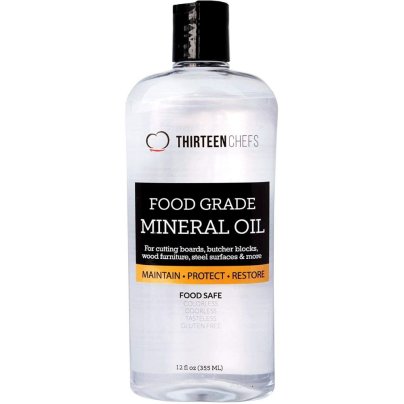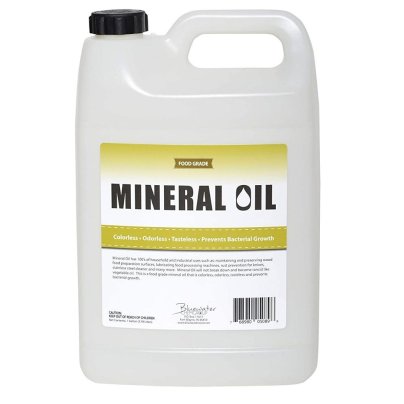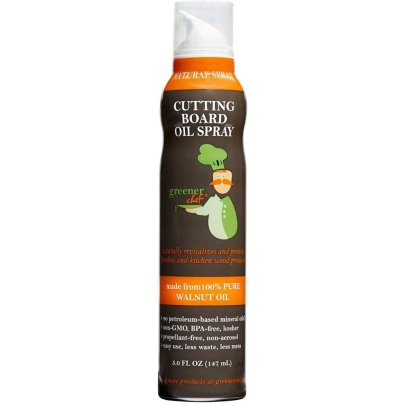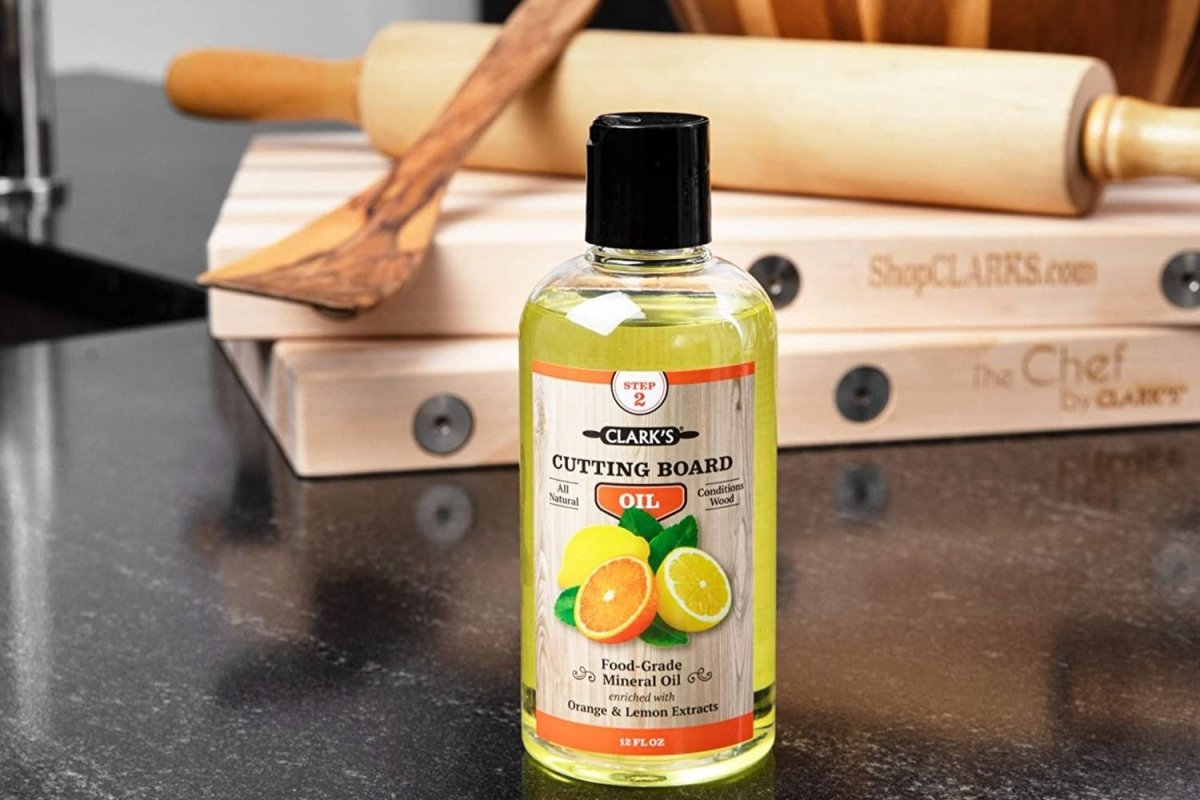
We may earn revenue from the products available on this page and participate in affiliate programs. Learn More ›
A stylish and elegant butcher block or cutting board is an essential tool in preparing meals and cutting meats. A high-quality wood cutting board is a purchase that should last a long time. Most people are likely already aware of the importance of properly cleaning a wooden cutting board to avoid cross-contamination. However, not everyone understands that cleaning is only half the job of caring for and maintaining a butcher block or a wooden cutting board.
To keep your butcher block or best cutting board protected and looking its best, you’ll need to find the best cutting board oil to maintain its sleek and stylish appearance as well as its durability. This guide lists several important considerations to keep in mind when shopping for cutting board oil and offers products that rank among the best cutting board oils.
- BEST OVERALL: Thirteen Chefs Food Grade Mineral Oil
- BEST BANG FOR THE BUCK: Sanco Industries NSF-Certified Food Grade Mineral Oil
- BEST SPRAY: Greener Chef Walnut Board Oil Spray
- BEST CONDITIONER: Howard Products Butcher Block Conditioner
- BEST-SMELLING: Clark’s Cutting Board Oil
- ALSO CONSIDER: Raw Plus Rare Food Grade Mineral Oil
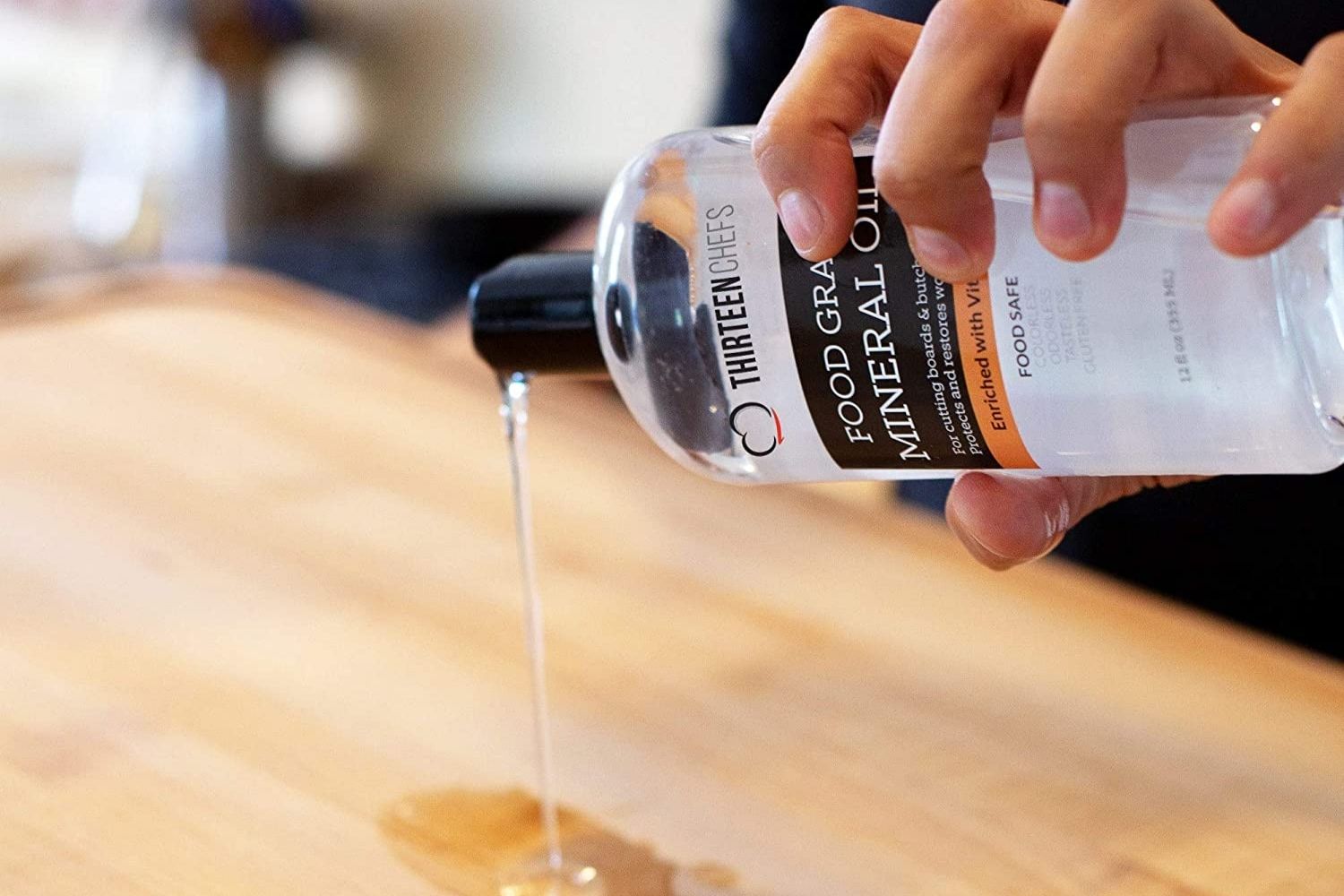
How We Chose the Best Cutting Board Oils
To help guide our research, we reached out to an expert woodworker to get their insights. In our interview with Josh Kou, who runs the family-owned wood and lumber supplier and manufacturer North Castle Hardwoods based in Chicago, he recommends all types of cutting boards to be maintained with either a hardening or non-hardening oil. “Certain woods will be naturally more stable than others, but any board can warp if not cared for. There are no species you cannot oil, but there are certain oils to avoid. Do not apply cooking oils (such as olive oil, avocado oil, canola oil, etc.) as they can get sticky, collect dirt and dust, and even get rancid fairly quickly.”
With this expert advice in mind, we researched the most sought-after cutting board oils in their respective categories and discovered that finding the best options requires a review of the products’ ingredients, ease of use, quantity, and other special features offered by top brands.
After extensive product research, we included options in our list of top picks that were made with food-safe mineral oil, walnut oil, lemon and orange oil, and vitamin E. These ingredients help ensure that cutting board oil is odorless, tasteless, and colorless to avoid altering the taste of foods prepared on the boards.
We were also careful to select options for our list that were easy to use on wooden boards, with some top picks coming with easy squirt bottles or spray applications. Plus, many of the best oils come in multiple quantity options, depending on the size of the project and the required frequency of application.
Kou added some last words of advice, saying There are a lot of options out there with different benefits. But the main thing is to take care of your cutting board. Neglecting to care for your cutting board can lead to it falling apart very quickly, but a well-cared-for cutting board can last for many years!” Armed with these insights, we hope our list of recommendations provides shoppers with the best options available to care for their cutting board.
Our Top Picks
The top picks below are a selection of some of the best cutting board oils on the market to help maintain these handy wooden treasures for years to come. To ensure our top picks could accommodate various needs, we organized each by category and provided each product’s notable pros and cons.
Best Overall
Thirteen Chefs Food Grade Mineral Oil
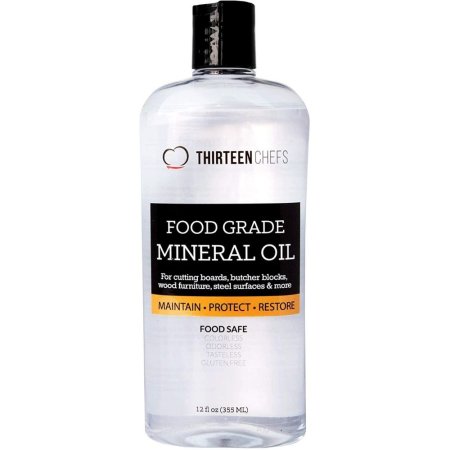
Pros
Cons
Product Specs
- Ingredients: Mineral oil
- Ease of use: Easy
- Quantity: 12, 64, or 128 fluid ounces
Thirteen Chefs has created a mineral oil using one of the highest available standards, which is approved by the USP, a scientific nonprofit organization focused on building trust in the supply of safe, quality, dietary supplements, foods, and medicines.
Food-grade and lab-tested mineral oil like this 12-ounce bottle is one of the safest products to use on wood and bamboo cutting boards, along with wooden utensils, countertops, salad bowls, and other wood products. This American-made oil seals, hydrates, and penetrates deeply into the wood to prevent drying and cracking with the use of a damp cloth. It features a push applicator top and an easy-squeeze container to ensure easy maintenance of a butcher block or cutting board.
Get the Thirteen Chefs cutting board oil at Amazon or Walmart.
Best Bang For The Buck
Sanco Industries NSF-Certified Food Grade Mineral Oil
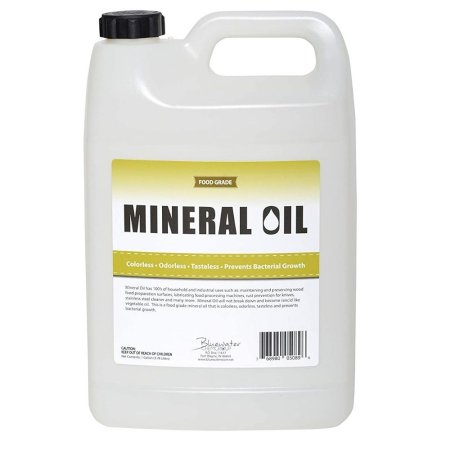
Pros
Cons
Product Specs
- Ingredients: Mineral oil
- Ease of use: Easy
- Quantity: 8 ounces, 1 gallon, or 4 gallons
Sanco Industries offers an entire gallon of this American-made, food-grade mineral oil for a fraction of the cost of most other cutting board oil products. Not only is it an ideal choice for maintaining the look and durability of a butcher block or wooden cutting board, but it also has hundreds of other household uses. This cutting board oil is approved by the
, a global, independent organization that facilitates the development of public health standards. The oil also is certified by the USP.
Besides maintaining any wooden kitchen surface or utensil, food-grade mineral oil can also be applied to stainless steel appliances and
to prevent rust and act as a protective barrier. It can also enhance the beauty of soapstone sinks and countertops or seal and refurbish slate and granite countertops. This affordable product is colorless, odorless, and tasteless, ensuring that it won’t affect the flavor of any foods placed on a butcher block or cutting board.
Get the Sanco Industries cutting board oil at Amazon or Sanco Industries.
Best Spray
Greener Chef Walnut Board Oil Spray
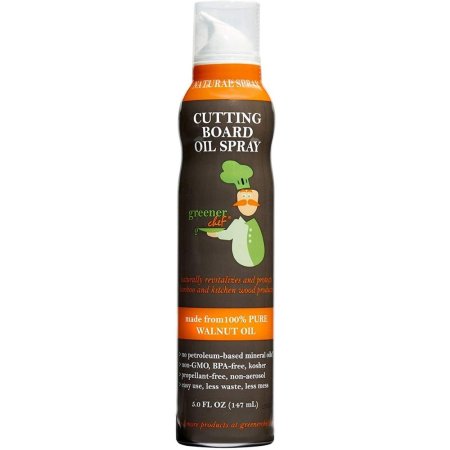
Pros
Cons
Product Specs
- Ingredients: Walnut oil
- Ease of use: Easy
- Quantity: 5 ounces
Formulated from 100 percent pure food-grade non-GMO walnut oil, the product from Greener Chef reliably protects wooden surfaces—from butcher blocks and cutting boards to utensils and even furniture—with ease and comfort. The innovative 5-ounce spray bottle provides three types of dispensing methods: stream, mist, and drip. This flexibility in application means less waste and fewer opportunities for a mess when caring for a favorite butcher block or cutting board.
Food-safe and produced in small, handcrafted batches, this nonaerosol, propellant-free spray stays fresh for up to 2 years. The spray bottle itself is BPA-free. Please note that those with nut allergies should avoid using this product.
Get the Greener Chef cutting board oil at Amazon or Greener Chef.
Best Conditioner
Howard Products Butcher Block Conditioner
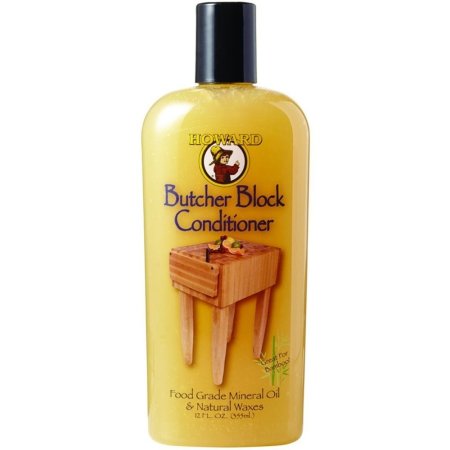
Pros
Cons
Product Specs
- Ingredients: Mineral oil, beeswax, vitamin E, Brazilian carnauba wax
- Ease of use: Easy
- Quantity: 12 ounces
It’s essential that a butcher block or cutting board be washed regularly to prevent bacterial growth and contamination. However, all that soapy water will dry it out within a short time unless a cutting board oil seals and protects the wood.
Conditioners like this American-made selection from Howard Products are ideal for maintaining wooden butcher blocks, cutting boards, wooden bowls, and utensils. In addition to a pure, USP-grade mineral oil enhanced with vitamin E, it contains Brazilian carnauba wax and genuine beeswax. The food-grade mineral oil penetrates the wood, and then the water-resistant beeswax and Brazilian carnauba wax help rejuvenate the wood and combat dryness. This 12-ounce bottle of conditioner is safe for all wood surfaces that come in contact with food.
Get the Howard Products cutting board oil at Amazon or Howard Products.
Best-smelling
Clark's Cutting Board Oil

Pros
Cons
Product Specs
- Ingredients: Mineral oil, lemon oil, and orange oil
- Ease of use: Easy
- Quantity: 12 ounces
This cutting board oil from Clark’s penetrates deeply into the grains of wooden kitchen tools—from butcher blocks and cutting boards to salad bowls and utensils—to prevent drying, splitting, and cracking.
The lemon- and orange-scented oils infused with natural food-grade mineral oil give this product a fresh take on ordinary cutting board maintenance. Citrus oils like lemon and orange have the bonus of containing antimicrobial properties to further combat bacterial growth. The orange and lemon scents are not overwhelming but instead create an aromatic blend. Apply it to a butcher block or cutting board every 3 to 4 weeks for optimal use. It’s available in a 12-ounce bottle.
Get the Clark’s cutting board oil at Amazon or Clark’s.
Also Consider
Raw Plus Rare Food Grade Mineral Oil
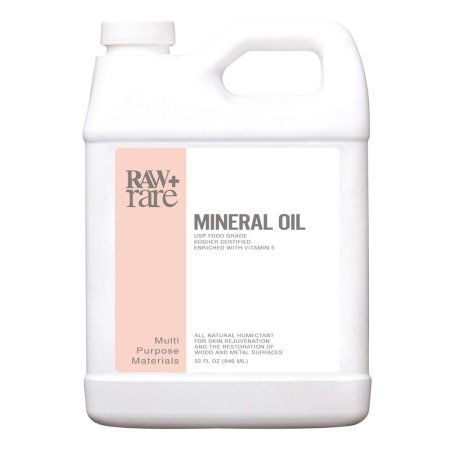
Pros
Cons
Product Specs
- Ingredients: Mineral oil and vitamin E
- Ease of use: Easy
- Quantity: 32 or 128 fluid ounces
Raw Plus Rare’s food-grade mineral oil is a vegan, organically sourced, non-GMO, and kosher-compliant option that’s excellent for those who want to maintain their butcher block, knives, cast-iron tools, and even soapstone countertops. It comes in 32- and 128-fluid-ounce resealable containers, and the built-in carrying handle allows for easy pouring and transport if needed.
Not only is this butcher block oil tasteless, odorless, and colorless, it is enriched with vitamin E and can be used as a treatment for eczema and dry skin. Plus, the manufacturer says that all of the ingredients are responsibly sourced, cruelty-free, and made in the U.S.
Get the Raw Plus Rare cutting board oil at Amazonor Walmart.
Jump to Our Top Picks
What to Consider When Choosing Cutting Board Oil
When choosing the best cutting board oil for your needs, it’s essential to look at the main ingredients that make up the oil, its consistency, how it is applied to the board, and any other additives that may be included. Keep in mind the following considerations as you shop for the best cutting board oil.
Ingredients
The primary purpose of using cutting board oil is to protect the entire surface of a butcher block or cutting board to prevent cracks, splits, and overall dryness. Each of these problems could result in fissures in the wood’s surface that allow bacteria to flourish and give off that rancid, sour smell that plagues old butcher blocks and cutting boards, especially if they are not cleaned properly. Mineral oil is one of the best and most common ingredients to keep the wood in peak condition.
Some might be surprised at this fact, due to a misconception that mineral oil is only used for industrial purposes. However, food-grade mineral oil is safe, odorless, and tasteless. It has been used as a laxative and skin softener for generations. It penetrates, seals, and hydrates wood to prevent it from cracking, drying, and even rotting due to prolonged contact with water. It also reduces the chance of staining if wine is accidentally splashed on it.
Another common ingredient is walnut oil, which gives a brilliant sheen to a butcher block or cutting board while simultaneously protecting it. Still, it might shorten the wood’s lifespan compared to mineral oil. Citrus oils like orange and lemon have certain antimicrobial properties that help combat bacteria on the wood’s surface, in addition to leaving behind a pleasing scent.
Liquid vs. Spray
Oils, by their very nature, are messy. This is particularly true for oils that are designed to coat an object. Cutting board oil is available in two consistencies: liquid and spray. The advantage of liquid cutting board oil is that users can apply a fair amount of protective coating to the wood relatively quickly. The disadvantage is if it is spilled onto surfaces other than the wooden cutting board, the oil is challenging to clean up. It can also stain fabrics if not treated fairly quickly with an absorbent material, followed by an acidic solvent like rubbing alcohol.
Spray types of cutting board oil provide the advantage of better control of the amount of oil applied at any time—which helps to avoid the abovementioned messes. The disadvantage is that applying the right amount of oil to the wood will likely take longer than liquid oil, which means a relatively quick task takes more time to accomplish.
Conditioning
Any wood product subjected to repeated washing and use will eventually break down and need replacing, including butcher blocks and cutting boards. An advantage to any wood conditioner is that you can further maintain the appearance and durability of a butcher block or cutting board by adding another layer of protection from the elements. In addition to mineral oil, cutting board conditioners include added ingredients like beeswax or carnauba wax to help seal in the rejuvenating effects of the oil application. These extra wax layers can add more luster to the wood’s appearance and extend its lifespan.
Application
To apply cutting board oil, pour or spray a generous amount onto the board’s top surface to start. Using a clean rag, rub the oil into the entire top surface area, including the juice groove if there is one. Use the same rag to make sure the board’s edges are wiped down with oil as well. If the edges are very thick, as with a butcher block, it might be necessary to add more oil to the rag. Wait 20 minutes, then apply a second coat of oil on the top and sides. After another 20 minutes, use a clean rag to wipe off any excess oil. If the board is double-sided, repeat the same process, minus the edges.
If treating a large wooden area like a countertop, apply three or four coats of oil and wait one hour between each coat to allow the oil to soak into the surface.
FAQs
If you have further questions about using cutting board oil on a butcher block, cutting board, or other wooden surfaces, keep reading. The answers to several of the most frequently asked questions below will explain how to use cutting board oil to keep those wooden surfaces looking and functioning their best.
Q. What kind of oil do you use on a cutting board?
Food-grade mineral oil is the most common oil to use on a butcher block or cutting board. Other popular options include walnut oil, and, in the case of cutting board conditioner, beeswax and carnauba wax.
Q. Is coconut oil good for cutting boards?
Yes and no. Conventional coconut oil can go rancid after a certain period of time, but some distilled versions can accomplish the desired effect on a cutting board.
Q. Do you oil both sides of a cutting board?
If a cutting board is double-sided, apply oil on both sides, including the edges, to prevent cracking, warping, and drying.
Q. How often should you oil a cutting board?
Oil a cutting board every two to four weeks, depending on how often you use it. However, there’s no harm in oiling it more frequently, if desired.
